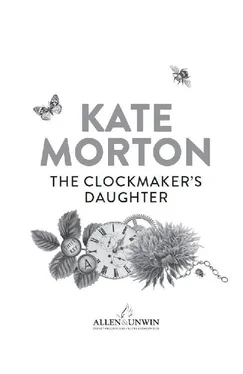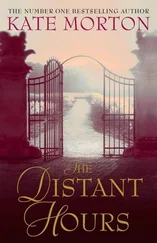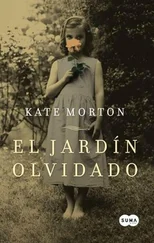Kate Morton - The Clockmaker's Daughter
Здесь есть возможность читать онлайн «Kate Morton - The Clockmaker's Daughter» весь текст электронной книги совершенно бесплатно (целиком полную версию без сокращений). В некоторых случаях можно слушать аудио, скачать через торрент в формате fb2 и присутствует краткое содержание. Год выпуска: 2018, Издательство: Allen & Unwin, Жанр: Старинная литература, на английском языке. Описание произведения, (предисловие) а так же отзывы посетителей доступны на портале библиотеки ЛибКат.
- Название:The Clockmaker's Daughter
- Автор:
- Издательство:Allen & Unwin
- Жанр:
- Год:2018
- ISBN:нет данных
- Рейтинг книги:4 / 5. Голосов: 1
-
Избранное:Добавить в избранное
- Отзывы:
-
Ваша оценка:
- 80
- 1
- 2
- 3
- 4
- 5
The Clockmaker's Daughter: краткое содержание, описание и аннотация
Предлагаем к чтению аннотацию, описание, краткое содержание или предисловие (зависит от того, что написал сам автор книги «The Clockmaker's Daughter»). Если вы не нашли необходимую информацию о книге — напишите в комментариях, мы постараемся отыскать её.
The Clockmaker's Daughter — читать онлайн бесплатно полную книгу (весь текст) целиком
Ниже представлен текст книги, разбитый по страницам. Система сохранения места последней прочитанной страницы, позволяет с удобством читать онлайн бесплатно книгу «The Clockmaker's Daughter», без необходимости каждый раз заново искать на чём Вы остановились. Поставьте закладку, и сможете в любой момент перейти на страницу, на которой закончили чтение.
Интервал:
Закладка:
Elodie laid the jagged piece of paper gently back inside the sketchbook.
Although antique now, the urgency of its message was unsettling: it spoke forcefully and currently of unfinished business.
Elodie continued to leaf carefully through the pages, each one filled with cross-hatched artist’s studies with occasional rough-sketched facial profiles in the margins.
And then she stopped.
This sketch was more elaborate than the others, more complete. A river scene, with a tree in the foreground and a distant wood visible across a broad field. Behind a copse on the right-hand side, the twin-gabled roofline of a house could be seen, with eight chimneys and an ornate weathervane featuring the sun and moon and other celestial emblems.
It was an accomplished drawing, but that’s not why Elodie stared. She felt a pang of déjà vu so strong it exerted a physical pressure around her chest.
She knew this place. The memory was as vivid as if she’d been there, and yet somehow Elodie knew that it was a location she’d visited only in her mind.
The words came to her then as clear as birdsong at dawn: Down the winding lane and across the meadow broad, to the river they went with their secrets and their sword .
And she remembered. It was a story that her mother used to tell her. A child’s bedtime story, romantic and tangled, replete with heroes, villains and a Fairy Queen, set in a house within dark woods encircled by a long, snaking river.
But there had been no book with illustrations. The tale had been spoken aloud, the two of them side by side in her little-girl bed in the room with the sloping ceiling—
The wall clock chimed, low and premonitory, from Mr Pendleton’s office, and Elodie glanced at her watch. She was late. Time had lost its shape again, its arrow dissolving into dust around her. With a final glance at the strangely familiar scene, she returned the sketchbook with the other contents to its box, closed the lid, and pushed it back beneath the desk.
Elodie had gathered her things and was halfway through the usual motions of checking and locking the department door to leave, when the overwhelming urge came upon her. Unable to resist, she hurried back to the box, dug out the sketchbook, and slipped it inside her bag.
CHAPTER TWO
Elodie caught the 24 bus north from Charing Cross to Hampstead. The Underground would have been faster, but she didn’t use the Tube. There was too much crowding, too little air, and Elodie didn’t do well in tight spaces. The aversion had been a fact of life since she was a child and she was used to it, but in this instance it was a regret; she loved the idea of the Underground, its example of nineteenth-century enterprise, its vintage tiles and fonts, its history and dust.
The traffic was grindingly slow, especially near Tottenham Court Road where the Crossrail excavation had left the backs of a row of brick Victorian terraces exposed. It was one of Elodie’s favourite views, providing a glimpse of the past so real it could be touched. She imagined, as she always did, the lives of those who’d dwelt within these houses long ago, back when the southern part of St Giles was home to the Rookery, a teeming, squalid slum of crooked alleys and cesspits, gin shops and gamblers, prostitutes and urchins; when Charles Dickens was making his daily walks, and alchemists plied their trade in the sewer-lined streets of the Seven Dials.
The younger James Stratton, sharing with so many of his fellow Victorians a keen interest in the esoteric, had left a number of journal entries recording visits to a particular spiritualist and seer in Covent Garden with whom he’d enjoyed a long-running dalliance. For a banker, James Stratton had been a gifted writer, his diaries providing vibrant, compassionate and at times very funny glimpses of life in Victorian London. He had been a kind man, a good man, committed to improving the lives of the poor and dispossessed. He believed, as he wrote to friends when he tried to enlist them to his philanthropic causes, that ‘a human being’s life and prospects must surely be improved by having a decent place to lay his or her head of a night’.
Professionally he had been respected, even liked, by his peers: a bright, sought-after dinner party guest, well travelled and wealthy, successful by every measure a Victorian man might care to name; yet, in his personal life, he’d cut a lonelier figure. He had married late, after a number of short-lived, improbable romances. There was an actress who’d run off with an Italian inventor, an artist’s model who was pregnant with another man’s child, and in his mid-forties he developed a deep and abiding affection for one of his servants, a quiet girl called Molly, upon whom he bestowed frequent small kindnesses without ever declaring his true feelings. It seemed to Elodie almost as if he’d set out purposely to choose women who wouldn’t – or couldn’t – make him happy.
‘Why would he do that?’ Pippa had asked with a frown when Elodie mentioned this thought to her over tapas and sangria one night.
Elodie wasn’t sure, only that although there was nothing overt in his correspondence, no declaration of unrequited love or confession of deep-seated unhappiness, she couldn’t help but sense something melancholy lurking beneath the pleasant surface of his personal letters; that he was a seeker for whom true fulfilment remained forever out of reach.
Elodie was used to the sceptical look that settled on Pippa’s face whenever she said that sort of thing out loud. She would never be able to describe the intimacy of working day after day amongst the artefacts of another person’s life. Elodie couldn’t understand the modern urge to share one’s innermost feelings publicly and permanently; she guarded her own privacy carefully and subscribed to the French notion of le droit à l’oubli – the right to be forgotten. And yet it was her job – more than that, her passion – to preserve, and even to reanimate, the lives of people who had no choice in the matter. She had read James Stratton’s most private thoughts, journal entries written without a view to posterity, yet he had never even heard her name.
‘You’re in love with him, of course,’ was Pippa’s comment whenever Elodie tried to explain.
But it wasn’t love; Elodie simply admired James Stratton and felt protective of his legacy. He had been granted a life beyond his lifetime and it was Elodie’s job to ensure it was respected.
Even as the word ‘respect’ took form in her mind, Elodie thought of the sketchbook, deep inside her bag, and her cheeks flushed.
What on earth had come over her?
Panic mixed with a terrible, wonderful, guilty sense of anticipation. Never in the decade that she’d worked in the archive room at Stratton, Cadwell & Co. had she transgressed so emphatically the edicts laid down by Mr Pendleton. His rules were absolute: to take an artefact from the vault – worse, simply to shove it in one’s bag and force upon it the sacrilege of being transported on a twenty-first-century London bus – was beyond disrespectful. It was inexcusable.
But as the number 24 skirted Mornington Crescent station and started up Camden High Street, with a quick glance to reassure herself that no one was watching, Elodie took the sketchbook from her bag and opened the pages quickly to the drawing of the house in its river setting.
Once again she was struck by a sense of profound familiarity. She knew this place. In the story that her mother used to tell, the house had been a literal gateway to another world; for Elodie, though, curled up in her mother’s arms, breathing in the exotic fragrance of narcissus that she wore, the story itself had been a gateway, an incantation that carried her away from the here-and-now and into the land of imagination. After her mother’s death, the world of the story had become her secret place. Whether at lunchtime in her new school, or at home in the long quiet afternoons, or at night when the darkness threatened suffocation, all she had to do was hide herself away and close her eyes and she could cross the river, brave the woods and enter the enchanted house …
Читать дальшеИнтервал:
Закладка:
Похожие книги на «The Clockmaker's Daughter»
Представляем Вашему вниманию похожие книги на «The Clockmaker's Daughter» списком для выбора. Мы отобрали схожую по названию и смыслу литературу в надежде предоставить читателям больше вариантов отыскать новые, интересные, ещё непрочитанные произведения.
Обсуждение, отзывы о книге «The Clockmaker's Daughter» и просто собственные мнения читателей. Оставьте ваши комментарии, напишите, что Вы думаете о произведении, его смысле или главных героях. Укажите что конкретно понравилось, а что нет, и почему Вы так считаете.












